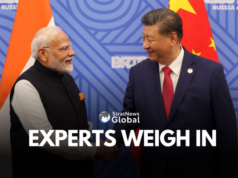Japanese Prime Minister Fumio Kishida announced on Wednesday that he will step down in September, ending his three-year tenure, which has been marked by political scandals and challenges such as rising prices and public dissatisfaction. His decision not to seek re-election as the Liberal Democratic Party (LDP) leader paves the way for a new premier to take the helm of the world’s third-largest economy.
Reasons For Stepping Down
Kishida’s announcement comes amid declining public support, largely due to revelations about the LDP’s ties to the controversial Unification Church and unrecorded political donations at party fundraising events. Additionally, his administration faced criticism for its failure to address the rising cost of living, as wages struggled to keep pace with inflation.
“Politics cannot function without public trust,” Kishida said during a press conference, emphasising the importance of public confidence in government. He also expressed his intention to support the newly elected LDP leader as a regular party member.
Implications For The LDP And Japan’s Leadership
Kishida’s decision triggers a contest to replace him as LDP president, with the winner set to become Japan’s next prime minister. The new leader will face significant challenges, including uniting a divided ruling party, addressing the country’s economic issues, and navigating escalating geopolitical tensions with China. They will also need to prepare for the potential return of Donald Trump as U.S. president, which could further complicate Japan’s foreign policy.
Kishida’s Legacy
During his time as prime minister, Kishida led Japan through the COVID-19 pandemic, implementing massive stimulus spending to support the economy. He also appointed Kazuo Ueda as head of the Bank of Japan (BOJ), with a mandate to steer the country away from radical monetary stimulus. However, the BOJ’s unexpected interest rate hike in July, coupled with rising inflation, contributed to market instability and a sharp decline in the yen.
Kishida’s economic policies departed from his predecessors’ profit-driven trickle-down approach, instead focusing on boosting household incomes through wage hikes and promoting share ownership. Despite this shift in economic policy, Kishida maintained a hawkish stance on security, unveiling Japan’s largest military buildup since World War II to counter China’s growing influence in East Asia.
International Relations And Defence Policy
Kishida also played a key role in mending Japan’s strained relations with South Korea, enabling the two countries to deepen security cooperation with the United States. This trilateral alliance has been crucial in countering the threat posed by North Korea’s missile and nuclear weapons programs.
“Under Prime Minister Kishida’s steadfast leadership, Japan and the United States have ushered in a new era of relations for the Alliance,” said U.S. Ambassador Rahm Emanuel in a post on X, formerly known as Twitter.
As Kishida prepares to step down, his successor will inherit both the opportunities and challenges that define Japan‘s current political landscape.
(With Inputs from Reuters)
Research Associate at StratNewsGlobal, A keen observer of #China and Foreign Affairs. Writer, Weibo Trends, Analyst.
Twitter: @resham_sng




